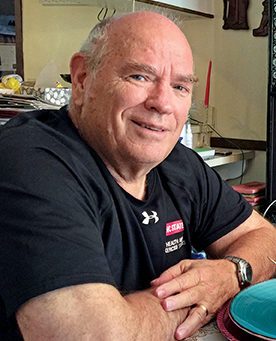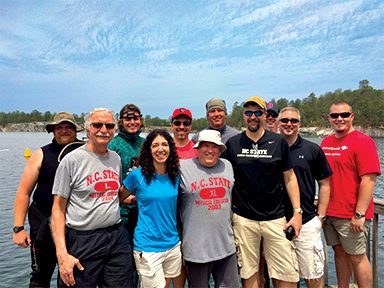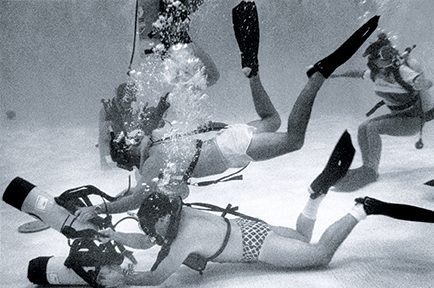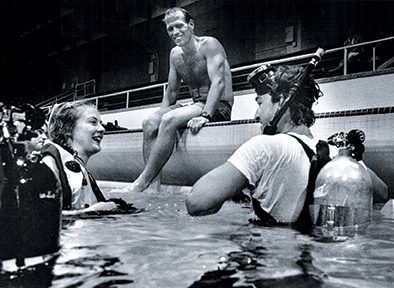Smile and Be Happy
A READER RECENTLY BROUGHT TO OUR ATTENTION that over the years multiple Alert Diver contributors have credited a particular dive instructor with providing training that saved their lives. Upon researching this connection, we discovered a previously unrecognized factor in the career development of many dive industry leaders and scuba pioneers, including a DAN Rolex Diver of the Year, a Women Divers Hall of Fame member, accomplished underwater scientists and researchers, cave explorers, public safety divers, Navy SEALs, service members across the U.S. armed forces, and dive team members in three-letter government agencies. In speaking with divers from each of these esteemed groups, we confirmed one thing they all had in common: Larry Brown was their scuba instructor.
Why did you become a dive instructor, and where did you teach?
Diving was always a spiritual experience for me that I wanted to share with others. When I was 17 I told my father I wanted to be a teacher. Dad only had a 10th-grade education, but he taught me more about education than anyone. He said to me, “Larry, if you can’t love every student like they’re your own kid, no matter how big of a jackass they are, you’ve got no business teaching.” It inspired me.
After separation from the Navy in 1971, I enrolled at Bringham Young University and taught scuba as a part-time faculty member. I started teaching as a sophomore and continued while completing my undergraduate and graduate degrees. After I moved back to the East Coast to be closer to my parents, I started teaching scuba at North Carolina State University in 1976 and taught there full time until I began phased retirement in 2019.
Why are so many of your students successful in the dive industry?
Each student decides for themselves what they want to become. It is something that is already growing inside them that I cannot take credit for. My job was to ensure that my volunteer assistants and I nourished that seed. The strength of the N.C. State scuba program has always been our volunteer assistants, both current and former students, who return to assist with the next class of divers. Our volunteers have always been givers, not takers — they are the stick that churns the butter. If anyone is responsible for the success of a student who went through the program while I was teaching, it’s them. There have been hundreds of volunteers over the decades to whom I am deeply indebted, and I love them as if they were my own children.
All the divers we talked to said your scuba classes were some of the most rigorous dive instruction they had ever received. They also said it was the most rewarding and that what you taught was applicable in life as well as in diving.
Achieving high standards gives students lifelong confidence and helps them learn they can do more than they thought possible. If you don’t have high standards for your students or you ask for less than their best, you rob them of reaching their full potential. Education often suffers because we water down things for the weakest students instead of taking the time and making the effort to bring them up to a higher level. Students need the self-satisfaction of earning and learning what they can achieve.
Life, like diving, is about learning how to thrive under pressure and developing an attitude of gratitude — smiling and being happy regardless of the circumstances. Adversity can help us learn things that we may not learn otherwise. It is important to learn that no matter how stressed we get, we can train our minds to be slow and relaxed, use good technique, and therefore be able to handle most hardships.
What was one of the best teaching tools that you implemented during your 50 years of instruction?
I realized early on that explaining and then demonstrating a skill was not sufficient enough for students to fully understand how to perform it, so I started demonstrating skills on 8mm film as a visual aid.
My assistants and I eventually started using TiVo to record students performing a skill and then would compare that with a video of my demonstration as the model. With instructor assistance, this technique allowed students to receive immediate feedback on their skills. It also gave them a way to both visualize and self-critique their performance — two critical elements in skills development and implementation.
What is the best advice you can give to any diver?
Many divers feel the need to be guided instead of achieving the knowledge and skills necessary to safely dive and explore the underwater world. Don’t be too trusting of others, including me, and be willing to question any information, standards, training procedures, skills, or research.
Don’t automatically assume that the way you’re doing things is the best and safest way just because someone you hold in high esteem believes that it is. Make the effort to critique and evaluate ideas and concepts for yourself to ensure they represent the best and safest way. If they don’t, then have the courage to go through appropriate channels and make changes. AD

Hometown: Perry, Florida
Age: 75
Years Diving: 62
Why I’m a DAN Member: DAN’s oxygen and CPR courses for dive emergencies, decompression theory seminars, and accident and fatality information provide tremendous educational value to students and instructors.



© Alert Diver — Q4 2023